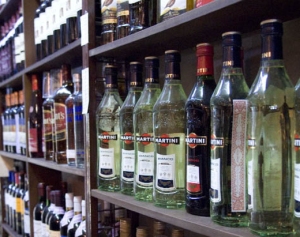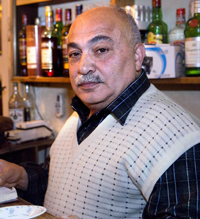Changing legislation is altering how alcohol is bought and consumed in Syria.
Assalamu Alaykum is not exactly how one expects to be greeted when walking into a liquor store. Yet, that is how Ayman Kaadan, owner of the Royal Stone alcohol shop in the Muslim-majority Barzeh neighbourhood greets his visitors.
Kaadan said he does not see any contradiction in being a Muslim who sells alcohol. However, liquor stores in Muslim areas were prohibited by Syrian law until July last year, when the law licensing alcohol shops was modified. Places where alcohol can be consumed, however – such as pubs and restaurants – are still illegal in Muslim-majority areas.
Modern alcohol legislation dates back more than 60 years. According to a law issued in 1952, pubs, restaurants and other locations where alcohol is consumed must be located in non-Muslim areas, 20 metres from police stations and government buildings and 100 metres from places of worship, schools, hospitals and cemeteries. A similar law used to govern liquor stores. Kaadan’s shop, which he opened in 2009, operated without a licence for two years.
According to employees at the governorate of Damascus, the growing demand for alcohol shops drove the Ministry of Local Administration to modify the law. The ministry issued a new law in July 2010, allowing liquor stores to open with the only restriction being that they be located 75 metres from places of worship and that shop owners do not allow customers to drink inside or in front of the store. When the new law was issued, Kaadan immediately applied. He was granted the licence late last year.
Unlicensed pubs
Since the law licensing liquor stores was modified, the number of new shops has increased. Other previously unlicensed shops also applied for licences, Ghassan Maamouri, director of the licensing unit at the governorate of Damascus told Syria Today.
The number of licensed pubs and restaurants serving alcohol, on the other hand, is decreasing, Abu George, the 50-something owner of a 70-year-old pub called Abu Gerorge’s, said. Abu George inherited the pub in Bab Sharqi from his father and grandfather.
“Many alcohol shops and pubs in my alley closed because their owners died and the family did not want to continue the business,” Abu George, who started working in the pub when he was seven, said. “The number of places of worship, schools and hospitals is steadily increasing. This is leaving little space for new, licensed pubs to replace the old ones.”
Because of the high public demand for pubs combined with the challenging licensing conditions, the number of unlicensed pubs is increasing, Somar Hazim, the owner of Beit Rose, a licensed alcohol-serving hotel in the old city, said. Hazim counted six unlicensed pubs near his hotel.
Maamouri from the licensing unit said that unlicensed places that sell or serve alcohol face penalties of SYP 500 (USD 11) and are given a two-week notice to apply for a licence. This penalty is repeated twice. If the owner still does not comply, his shop is closed. The governorate, however, could not provide statistics about the number of unlicensed alcohol selling and serving shops that have been recently closed down.
Hazim from Beit Rose hotel said that this system is not enough. He argued that strict monitoring is required. Kaadan from Royal Stone alcohol shop agreed.
“I didn’t have any trouble with the governorate for the first year-and-a-half when my shop was unlicensed. Unless neighbours file a complaint against the shop, the governorate does not know that the shop is unlicensed,” he said.
Hazim said that this is affecting his and other licensed, alcohol-serving establishments.
“Some restaurants serve alcohol undercover,” he said. “They don’t have to pay taxes so they can sell alcohol for cheaper prices than we do. It is spoiling our business.”
Customers at Abu George’s like 20-something Maher Samaan also complain that, with the lack of monitoring from the government, many unlicensed pubs mix local, low-quality alcohol with imported liquor, while illegal stores often sell smuggled, low-quality alcohol.
Anwar Hamoud, owner of liquor store in Dummar, argued that the unreasonably high taxes on alcohol – as high as 85 percent of the product price – encourages illegal sales, which harms business.
“[Unlicensed shops] can afford to sell for much cheaper than legal purchasers of alcohol can. This leads to great losses in the government treasury,” Hamoud said. “If taxes were reduced, it would no longer be worth it for smugglers to risk being caught.”
Segregating non-Muslims
Salina Abaza, a graphic designer in her twenties who enjoys going to pubs, said she believes that the law regarding pubs and other alcohol serving places should be modified. She said that restricting alcohol serving places to predominantly non-Muslim areas segregates the country’s non-Muslim community.
“Serving alcohol in only non-Muslim areas limits the places where Christians, for example, can hang out,” she said. “This segregates them from other Syrians.”
Tony Khouri, a 40-something trader and one of Abu George’s regulars, agreed.
“I like going out and having lunch with my wife and drinking a glass of wine, but I’m bored of the old city. I live and work here so it would be nice to hang out somewhere else,” he said. “The problem is there is only a handful of restaurants that serve alcohol outside old Damascus and their numbers are decreasing.”
Pub owners in Bab Sharqi also said they believe that restricting alcohol-serving places to predominantly non-Muslim areas is ridiculous, since most of their customers are Muslim.
“About 70 percent of my customers are Muslim,” Abu George said. “Even veiled women come and have a drink in my pub.”
This article was published in Syria Today magazine.



